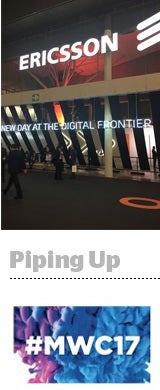Ericsson is about to enter an unexpected space: ad tech.
The Swedish networking giant is testing a mobile ads platform to aggregate anonymized deterministic data from across telecom operators to power targeted advertising.
Ericsson declined to say whether it’s building the platform itself, licensing it or buying an ad tech company to power its nascent ad stack.
The platform is already being trialed with a few telcos in the US and Singapore. A more general rollout is slated for the end of Q1 or beginning of Q2 with several operators across the US, Latin America, South Asia and parts of Europe.
Mobile data quality is lacking outside of Facebook and other closed systems, said Salman Taj, head of incubation and chief innovation officer at Ericsson, and that provides operators with an opportunity to serve up their subscriber data as an accurate alternative.
But with the possible the exception of Verizon, telcos are hindered by their lack of scale – and that’s what advertisers are looking for, Taj told AdExchanger at the Mobile World Congress in Barcelona.
Without it, telco data is too fragmented for advertisers to take advantage of in any meaningful way.
Ericsson wants to act as a neutral party where telcos can make their anonymized user data available to the buy side en masse. Ericsson will ingest the data, normalize it, hash it for privacy purposes and create proxy IDs so the original identifier can’t be used to trace a profile back to a specific user. Customer proprietary network information or CPNI data, the data collected by telecom companies about their customers’ phone calls, is completely off the table.
Advertisers then will be able to access audience segments through the platform.
At the start, only basic demographic data will be available. The next step will be to layer in other data sets like location and interest-level data derived from browsing habits.
Ericsson will have to pay close attention to regional privacy norms and honor opt-out requirements, which can vary from country to country. And in the EU, the General Data Protection Guidelines are set to take effect next year.
Telcos generally are extremely risk averse, especially when it comes to privacy, but advertisers are hungry for more accurate mobile data, Taj said. Most telcos get why their data is valuable, but they’re still at a loose end as to how they can take advantage, he said.
Few telcos will buy their own ad tech platform like Verizon, Telenor or SingTel did. Most want to monetize their data, but aren’t willing to make a large upfront investment.
“The feedback we’re getting from the market, from potential customers, including brands and agencies, is that there just isn’t enough quality data in mobile, so whatever they can get is valuable to them,” he said.
According to a report released in January by mobile data company Pinsight Media, an independent subsidiary of Sprint, the majority of age data (60%) on the open exchange is inaccurate and off by at least 10 years on average.
Ericsson doesn’t expect to make any money off of mobile advertising in 2017. This year is about validating the model and getting more operators on board, Taj said.
Taj admitted that for a company as enormous as Ericsson – its revenue was 222.6 billion Swedish krona last year (about $24.5 billion) – mobile advertising is never going to be its bread and butter.
But the opportunity is still ripe, he said. In 2016, mobile advertising increased by more than 48% globally, hitting $80 billion, as per Magna Global’s winter forecast, which predicted growth to continue throughout this year.
And those estimates are probably conservative. Dollars stubbornly continue to lag on mobile compared to TV and digital, Taj said.
“We’re confident that having proper data will accelerate spending on mobile,” he said.












